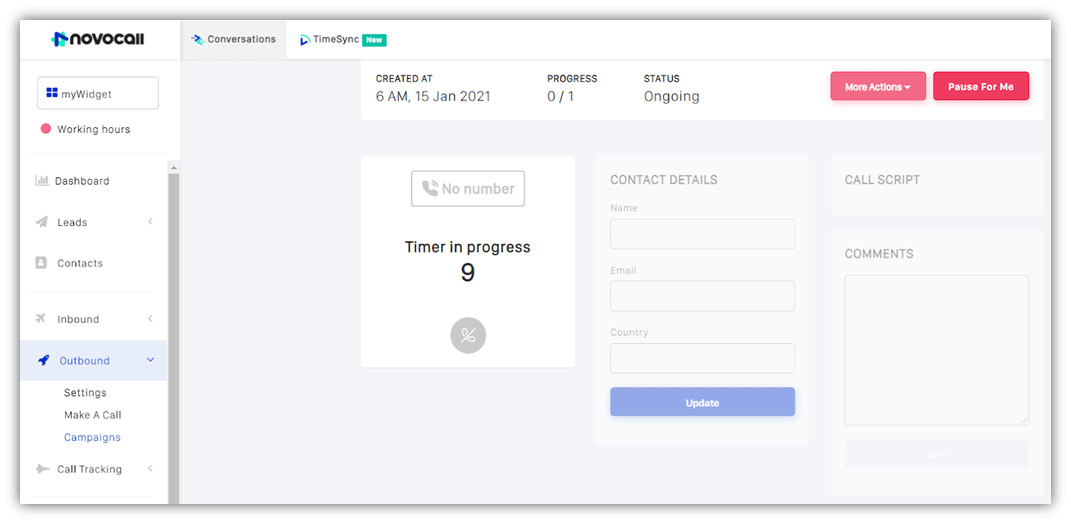

Start driving better conversations.
Novocall will be your new favorite business phone system.

Every business struggles with time wastage and sales productivity. This stems from the increasing pressure to meet sales targets and achieve business growth.
In fact, research by The Bridge Group found that about 65% of B2B companies find sales productivity the number one challenge they face on a daily basis. And only about 35.2% of your sales reps spend the time actually selling.
But, what exactly is sales productivity and how can you improve it?
Here’s what we’ll cover in this article:
Sales productivity is the function of a salesperson’s efficiency (input) to effectiveness (output). Simply put, it is a measure of how well your sales team is maximizing its sales per unit resource (e.g. time, money, and effort) invested.
According to sales enablement tool Highspot, you can view sales productivity in the form of a matrix where efficiency is plotted against effectiveness.

But wait, don’t sales efficiency, effectiveness, and productivity mean pretty much the same thing?
Well, no. And it’s normal for people to think that way. These terms have been used interchangeably for so long that this mistake has become the norm.
But we’re here to set things right 😤
Sales efficiency is the optimizing of the amount of resources (input) your sales reps have. And these resources can come in various forms:
Say you define ‘resources’ as the amount of time each sales rep has to make cold calls using an outbound call dialer, a sales efficiency metric you can measure is the number of calls made per day.
Sales effectiveness is basically how well/effective you are at utilizing your resources.
If you measure sales efficiency in terms of the number of calls each sales rep makes per day, then sales effectiveness is measured in terms of the number of successful calls (output) per day.
It’s all about what you do with those resources (input).
Notably, it is a lot harder to improve sales effectiveness because more effort is needed to develop the capabilities of your sales team. Not only do you need to identify the problem, but you also need to find the right solution to it.
For instance, if you’ve identified that your sales reps are not making enough successful sales calls, you need to invest resources into helping them improve. For example, you can help your reps learn effective communication skills from an online master’s program or webinar.
Well, there isn’t one way to calculate it. that depends on how you define sales productivity.
If you define sales productivity as the % of successful calls per sales rep,
Then sales productivity = [number of successful calls made (sales effectiveness) ÷ total number of calls made (sales efficiency)] x 100
If you define sales productivity as the % of successful meetings booked,
Then sales productivity = [number of successful meetings booked (sales effectiveness) ÷ total number of calls made (sales efficiency)] x 100
See a pattern?
Ok, I don’t want to sound like a broken record, but sales productivity, sales efficiency, and sales effectiveness have no clear definition.
You need to define them yourself.
If you don’t even know what you’re measuring, how do you measure it and assess your sales team’s performance?
At the end of the day, it’s not about the number of calls that matter. What matters are things like the amount of revenue generated from closed deals and number of MQLs that convert into SQLs.
If you look at the formula for calculating sales productivity above, you’ll notice that sales productivity is directly proportional to sales effectiveness. This means that if sales effectiveness increases, sales productivity increases proportionally.
Focusing on improving what you do (sales effectiveness) with your limited resources will definitely increase your sales productivity levels.
There are too many business processes out there that should be automated. Especially those that are tedious yet have the most impact on sales productivity. For instance, the number of outbound calls you are making.

Novocall’s autodialer allows you to upload long lists of contact information and create automated cold calling campaigns. All you need to do is is to have the list ready, upload it, customize your call settings, and let the software do all the calling for you.
This helps save tons of time that would otherwise have been wasted on manually dialing the numbers. This ultimately helps you shorten your sales cycles as well.

When selecting software you want to use to automate your business processes, there are a few things you should pay attention to:
If the software you have in mind meets all three criteria, then go ahead and make that purchase!
Now, what’s the point of all that measuring and data collecting if you’re not going to put the data to good use?
It is essential to use the data collected to generate insights to improve your performance.
If your reps aren’t making enough calls, why?
If your reps are making enough calls but not closing enough deals, why?
Data collection can help you make educated guesses about why you are not hitting your goals. From there, your sales teams can come up with solutions to help address the issues you face.
So, do you have a better understanding of what sales productivity is and how you can improve it?
The key thing to remember here is that to truly be productive, you have to establish what it means to you and how you can measure them. There’s no point following what others do if it doesn’t work for your business! 😉
If you need more sales and marketing-related tips, check out our blog!

Nigel is a Digital Marketing Executive at Novocall where he specializes in SEO. Prior to this, he had written for several SaaS companies including Workstream and the now defunct Hatchme. In his free time, he engages in strength training and is a lover of languages.
Discover more
Subscribe to our blog
Get insights & actionable advice read by thousands of professionals every week.

